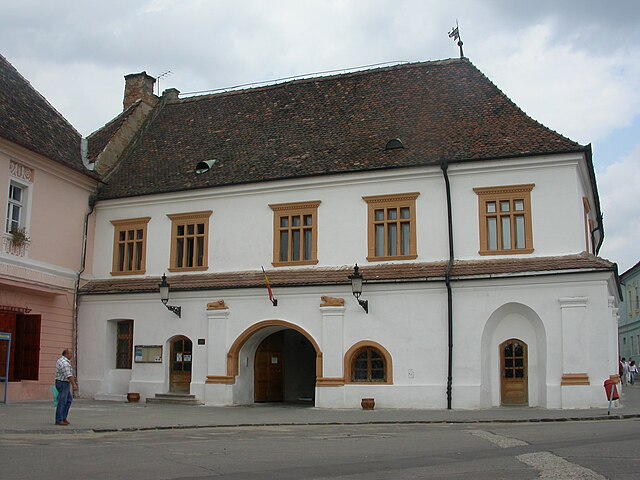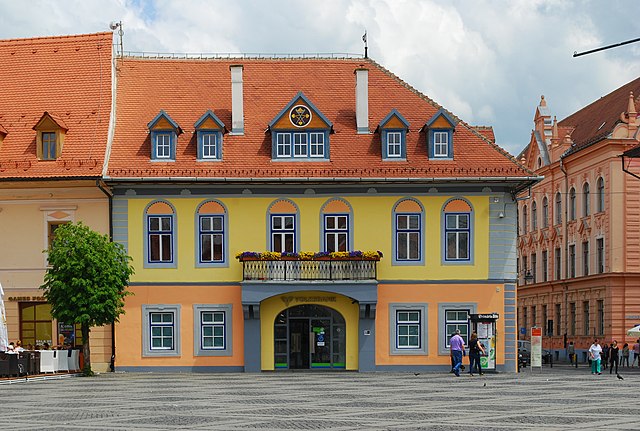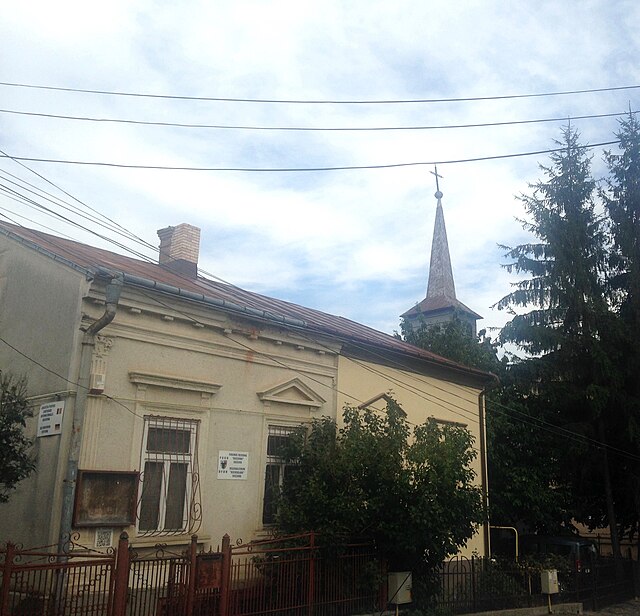Top Qs
Timeline
Chat
Perspective
Democratic Forum of Germans in Romania
Political party in Romania From Wikipedia, the free encyclopedia
Remove ads
The Democratic Forum of Germans in Romania (German: Demokratisches Forum der Deutschen in Rumänien, DFDR; Romanian: Forumul Democrat al Germanilor din România, FDGR; in short Forumul German or Das Forum) is a political party (legally recognized as an association of public utility according to the governmental decision HG 599 as per 4 June 2008) organised on ethnic criteria representing the interests of the German minority in Romania.[4][5][6]
Initially, the FDGR/DFDR was a cultural association representing the culture of the German community in Romania, but it subsequently became a moderately successful local political party (especially amongst Romanian voters as well), most notably in parts of Transylvania (central Romania) and Banat (south-western Romania). Consequently, the counties where the FDGR/DFDR obtained the highest political scores in many local elections after 1989 are Sibiu (German: Kreis Hermannstadt) and Timiș (German: Kreis Temesch) respectively.
Remove ads
History (1989–present)
Summarize
Perspective
The forum was founded at the end of 1989, in the wake of the Romanian Revolution which culminated with the downfall of Nicolae Ceaușescu's dictatorship.[7]: 303 Despite originally being a German minority party (and, initially, a cultural organization), it gradually grew quite popular amongst many ethnic Romanians, especially in parts of Transylvania and Banat, including, most notably, the major town of Sibiu (German: Hermannstadt), where the party still holds a majority in the local town council (12 out of 23 seats), as well as in the County of Sibiu.[8] Aside from its significant presence in Transylvania and Banat, the FDGR/DFDR is also active in Bukovina (i.e. Suceava County), yet without any elected representatives in the local politics, acting instead in the manner of a cultural foundation which periodically organizes a wide range of educational and cultural events.
In terms of reputation, the party is regarded as independent, whilst its politicians, including former Sibiu mayor, former party leader, and former President of Romania, Klaus Johannis, have earned respect as thorough administrators.[9] The FDGR/DFDR has often cooperated with the National Liberals (PNL), to which Iohannis became a member and one of its prime leaders (as vice-president) starting from February 2013. Additionally, the FDGR/DFDR also has a youth wing known as the German Youth Federation in Romania (German: Jugendforum), currently headed by Adelheid Simon.[10]
At local administration level, most notably in Timișoara (German: Temeswar or Temeschburg) or Baia Mare (German: Frauenbach or Neustadt), the FDGR/DFDR has also co-operated with another Romanian centre-right historical party, namely the PNȚCD.[11] For the 2020 Romanian local elections however, the FDGR/DFDR supported Dominic Fritz (the candidate of the USR PLUS, now USR) for the seat of mayor of Timișoara which the latter also won in the first round with 53.24% over former national liberal (PNL) mayor Nicolae Robu.
In recent years, the main headquarters of FDGR/DFDR in Sibiu (German: Hermannstadt) organised several foreign receptions of high ranking German officials, among which most notably there were former Christian Democratic Union of Germany (CDU) leader and former chancellor Angela Merkel and president Joachim Gauck.[12][13]
Remove ads
Overview and organization
Summarize
Perspective



The history of the German minority in Romania, and mostly, their presence in the historical region of Transylvania, spans approximately a millennium back in time. Nevertheless, under the blanket term "Romanian Germans" (German: Rumäniendeutsche) a wide variety of different regional German-speaking groups are included (some which are native to other regions of Romania) as follows:
 Transylvanian Saxons (the eldest ethnic German sub-group on the territory of present-day Romania);
Transylvanian Saxons (the eldest ethnic German sub-group on the territory of present-day Romania); Banat Swabians (including Banat Highland Germans);
Banat Swabians (including Banat Highland Germans); Sathmar Swabians;
Sathmar Swabians; Bukovina Germans;
Bukovina Germans; Transylvanian Landler;[c]
Transylvanian Landler;[c] Zipser Germans;[d]
Zipser Germans;[d] Regat Germans;[note 1]
Regat Germans;[note 1] Dobrujan Germans;
Dobrujan Germans; Bessarabia Germans (former Romanian citizens between 1918 and 1940).
Bessarabia Germans (former Romanian citizens between 1918 and 1940).
Since 2000, the FDGR/DFDR has won offices on both local and regional levels. In Sibiu (German: Hermannstadt), the FDGR/DFDR's Klaus Johannis has held the office of mayor from 2000 to 2014. In 2004, the forum gained 60.43% of votes in local elections for the Municipal Council. In addition, the FDGR/DFDR held 12 out of 23 seats in the Sibiu Municipal Council, forming an absolute majority alongside the PNL.
Following the 2016 local elections in Sibiu County (which has a population of about 450,000 residents), the FDGR/DFDR won 8 out of 33 seats in the County Council, where it is the third strongest political faction, after the National Liberals (PNL) and Social Democrats (PSD).
The FDGR/DFDR has also had mayors in office since 2004 in the cities of Mediaș (German: Mediasch) and Cisnădie (German: Heltau), as well as in a few villages in Satu Mare (German: Sathmar) county. The FDGR/DFDR is an associated member of the Federal Union of European Nationalities and was formerly affiliated with the European People's Party (German: Europäische Volkspartei).
Additionally, at local political level, the FDGR/DFDR is organized in five distinct branches as follows: FDGR Banat (German: DFDR Banat), FDGR Bucovina (German: DFDR Buchenland), FDGR Transilvania (German: DFDR Siebenbürgen), FDGR Transilvania de Nord (German: DFDR Nordsiebenbürgen), and FDGR Regiunea Extra-carpatică (German: DFDR Altreich).[15][16]
Remove ads
Controversies
Both during and after the 2014 presidential campaign of former FDGR/DFDR president Klaus Johannis, who subsequently became president of the National Liberal Party (PNL) during the autumn of the same year, the Social Democratic Party (PSD) accused the forum of being the legal continuator of the German Ethnic Group (Romanian: Grupul Etnic German din România) concerning alleged dubious retrocessions of several buildings from Sibiu (German: Hermannstadt) by Johannis during his terms as mayor to the forum itself.[17] While the German Ethnic group was indeed a fascist organisation during World War II which represented the German minority in Romania between 1940 and 1944, the FDGR/DFDR is a distinct platform which has nothing to do with the latter, formed after 1989 anti-communist revolution and consequently not inheriting anything from it.[18]
Presidents

- 1990–1992: Thomas Nägler;[e]
- 1992–1998: Paul Philippi;[f]
- 1998–2001: Eberhard Wolfgang Wittstock;
- 2001–2013: Klaus Werner Johannis;
- 2013–present: Paul-Jürgen Porr.[19][20]
Chronology of FDGR/DFDR deputies
- 1990–1992: Ingmar Brandsch;
- 1992–1996: Eberhard Wolfgang Wittstock;
- 1996–1997: Werner Horst Brück;
- 1997–2004: Eberhard Wolfgang Wittstock;
- 2004–present: Ovidiu Victor Ganț.[21][22]
Localities with FDGR/DFDR mayors
Summarize
Perspective
2016 Romanian local elections


After the 2016 Romanian local elections, the FDGR/DFDR candidates won the following localities (most of them belonging to Satu Mare County):[23][24]
- Cămin (German: Kalmandi), Imre Sütő;
- Sanislău (German: Stanislau), Ioan-Zoltan Kardosi;
- Turulung (German: Turterebesch), Gheorghe-Nicolae Gyákon;
- Petreşti (German: Petrifeld), Iosif Mellau;
- Sibiu (German: Hermannstadt), Astrid Fodor.
Furthermore, the FDGR/DFDR also held 91 local councillor seats in 32 communes.[25]
2020 Romanian local elections
After the 2020 Romanian local elections, the FDGR/DFDR candidates won the following localities (most of them belonging to Satu Mare County):
- Cămin (German: Kalmandi), Imre Sütő;
- Sanislău (German: Stanislau), Ioan-Zoltan Kardosi;
- Turulung (German: Turterebesch), Gheorghe-Nicolae Gyákon;
- Petreşti (German: Petrifeld), Gheorghe Otto Marchis;
- Sibiu (German: Hermannstadt), Astrid Fodor.
In addition, the party now holds 68 local council seats (39 in Satu Mare, 13 in Sibiu, 10 in Brașov, 4 in Timiș, 1 in Maramureș, and 1 in Arad) as well as 5 county council seats in Sibiu County.
2024 Romanian local elections
After the 2024 Romanian local elections, the FDGR/DFDR candidates won the following localities (most of them belonging to Satu Mare County):
- Cămin (German: Kalmandi), Imre Sütő;
- Sanislău (German: Stanislau), Stefan Krémer;
- Turulung (German: Turterebesch), Gheorghe-Nicolae Gyákon;
- Petreşti (German: Petrifeld), Gheorghe Otto Marchis;
- Sibiu (German: Hermannstadt), Astrid Fodor.
In addition, the party now holds 53 local council seats (40 in Satu Mare, 9 in Sibiu, 2 in Timiș and 2 in Brașov) as well as 5 county council seats in Sibiu County.
Remove ads
Notable FDGR/DFDR politicians
- Astrid Fodor, the current mayor of Sibiu (German: Hermannstadt)[26]
- Wilhelm Fabini, sculptor and artist
- Martin Bottesch, former President of the Sibiu County Council
- Ovidiu Victor Ganț, member of Parliament and MEP for Romania (2007–09)
- Daniel Thellmann, former mayor of Mediaș (German: Mediasch) and founding member of DFDR/FDGR
- Klaus Johannis, 5th President of Romania
- Paul Philippi, theologian and President of FDGR/DFDR
- Eberhard Wolfgang Wittstock, journalist and former FDGR/DFDR Member of Parliament
- Arnold Günter Klingeis, former mayor of Avrig (German: Freck)
Remove ads
Electoral performance
Summarize
Perspective
Local elections
Legislative elections
Presidential elections
Notes:
1 Klaus Iohannis was still a member of the FDGR and he was the common centre-right candidate that was endorsed in 2014 by the Christian Liberal Alliance (ACL).[28]
2 Klaus Iohannis was endorsed by FDGR and PNL.[29]
3 Crin Antonescu was announced as common PSD, PNL, UDMR and Minorities candidate.[30]
Remove ads
See also
Further reading
- 2014 – Step by step (Romanian: Pas cu pas, German: Schritt für Schritt, ISBN 978-606-588-756-5), autobiographical volume by Klaus Johannis and bestseller in the history of Gaudeamus International Book and Education Fair, detailing his political career as mayor of his native Sibiu (German: Hermannstadt).[31][32]
- 2015 – First step (Romanian: Primul pas, German: Erster Schritt, ISBN 978-606-588-831-9), a continuation of the volume "Step by step" by Klaus Johannis which was published in 2014. The volume describes his future plans as president.[33]
- 2019 – EU.RO – un dialog deschis despre Europa (English: EU.RO – an open dialog on Europe, German: Ein offener Dialog über Europa), an introductory and statistical volume on the European Union (EU)[34]
Remove ads
Notes
- (German: Geschäftsführer)
- Can be somewhat considered as part of the Transylvanian Saxon community, at least in religious terms, being also Evangelical Lutheran.
- Native to both Maramureș and Bucovina, a sub-group of the Carpathian Germans (German: Karpatendeutsche or Mantaken)
- The term Regat refers to the territorial extent of the Old Romanian Kingdom and, respectively, of the Kingdom of Romania before World War I.
Remove ads
References
External links
Wikiwand - on
Seamless Wikipedia browsing. On steroids.
Remove ads